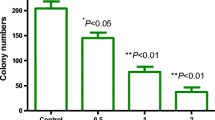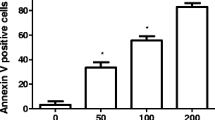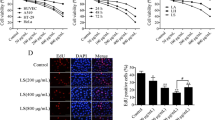Abstract
One purified polysaccharide protein tyrosine phosphatase (PTP) was isolated from the roots of Polygala tenuifolia. The aim of the present study is to investigate the antitumor effect of PTP on human ovarian cancer OVCAR-3 cells and explore the molecular mechanism of the action involved. The results of MTT assay and apoptosis detection assay showed that PTP inhibited cellular proliferation of OVCAR-3 cells and induced apoptotic cellular death via arresting cell circle at the G0/G1 phase. Reverse transcription-polymerase chain reaction (RT-PCR) and Western blot analysis identified that bcl-2 gradually decreased at both transcription and protein levels after PTP treatment for 48 h in OVCAR-3 cells, while those of bax, cytochrome c, caspase-3, and caspase-9 increased. In addition, the low expression of NF-κB in PTP-treated OVCAR-3 cells would trigger the extrinsic pathway of programmed cell death signaling in tumor cells. These results together suggest that PTP may induce apoptosis of OVCAR-3 cells through a mitochondrial pathway.





Similar content being viewed by others
References
Sawa M, Yamamoto K, Yokozawa T, Kiyoi H, Hishida A, Kajiguchi T, et al. BMI-1 is highly expressed in M0-subtype acute myeloid leukemia. Int J Hematol. 2005;82:42–7.
Beà S, Tort F, Pinyol M, Puig X, Hernández L, Hernández S, et al. BMI-1 gene amplification and overexpression in hematological malignancies occur mainly in mantle cell lymphomas. Cancer Res. 2001;61:2409–12.
Becker M, Korn C, Sienerth AR, Voswinckel R, Luetkenhaus K, Ceteci F, et al. Polycomb group protein Bmi1 is required for growth of RAF driven non-small-cell lung cancer. PLoS One. 2009;4:e4230.
Kim JH, Yoon SY, Jeong SH, Kim SY, Moon SK, Joo JH. Overexpression of Bmi-1 oncoprotein correlates with axillary lymph node metastases in invasive ductal breast cancer. Breast. 2004;13:383–8.
Kim JH, Yoon SY, Kim CN, Joo JH, Moon SK, Choe IS, et al. The Bmi-1 oncoprotein is overexpressed in human colorectal cancer and correlates with the reduced p16INK4a/p14ARF proteins. Cancer Lett. 2004;203:217–24.
Song LB, Zeng MS, Liao WT, Zhang L, Mo HY, Liu WL, et al. Bmi-1 is a novel molecular marker of nasopharyngeal carcinoma progression and immortalizes primary human nasopharyngeal epithelial cells. Cancer Res. 2006;66:6225–32.
Glinsky GV, Berezovska O, Glinskii AB. Microarray analysis identifies a death from cancer signature predicting therapy failure in patients with multiple types of cancer. J Clin Invest. 2005;115:1503–21.
Zhang F, Sui L, Xin T. Correlations of BMI-1 expression and telomerase activity in ovarian cancer tissues. Exp Oncol. 2008;30:70–4.
Hannon GJ. RNA interference. Nature. 2002;418:244–51.
Liu L, Andrews LG, Tollefsbol TO. Loss of the human polycomb group protein BMI1 promotes cancer-specific cell death. Oncogene. 2006;25:4370–5.
Xin T, Zhang FB, Sui GJ, Jin XM. Bmi-1 siRNA inhibited ovarian cancer cell line growth and decreased telomerase activity. Br J Biomed Sci. 2012;6:62–6.
Xin T, Zhang F, Jiang Q, Chen C, Huang D, Li Y, et al. Extraction, purification and antitumor activity of a water-soluble polysaccharide from the roots of Polygala tenuifolia. Carbohydr Polym. 2012;90:1127–31.
Dubois M, Gilles KA, Hamilton JK, Rebers PA, Smith F. Colorimetric method for determination of sugars and related substances. Anal Chem. 1956;28:350–6.
Xin T, Zhang F, Jiang Q, Chen C, Huang D, Li Y, et al. The inhibitory effect of a polysaccharide from Codonopsis pilosula on tumor growth and metastasis in vitro. Int J Biol Macromol. 2012;51:788–93.
Yan YY, Su XD, Liang YJ, Zhang JY, Shi CJ, Lu Y, et al. Emodin azide methyl anthraquinone derivative triggers mitochondrial-dependent cell apoptosis involving in caspase-8-mediated Bid cleavage. Mol Cancer Ther. 2008;7:1688–97.
Liang M, Li SC, Shen B, Cai JP, Li C, Wang ZY, et al. Anti-hepatocarcinoma effects of Aconitum coreanum polysaccharides. Carbohydr Polym. 2012;88:973–6.
Yang SF, Chen MK, Hsieh YS, Yang JS, Zavras AI, Hsieh YH, et al. Antimetastatic effects of Terminalia catappa L. on oral cancer via a down-regulation of metastasis-associated proteases. Food Chem Toxicol. 2010;48:1052–8.
Harris MH, Thompson CB. The role of the Bcl-2 family in the regulation of outer mitochondrial membrane permeability. Cell Death Differ. 2012;7:1182–91.
Micoud F, Mandrand B, Malcus-Vocanson C. Comparison of several techniques for the detection of apoptotic astrocytes in vitro. Cell Prolif. 2001;34:99–113.
Lee EO, Lee JR, Kim KH, Baek NI, Lee SJ, Lee BH, et al. The methylene chloride fraction of Trichosanthis Fructus induces apoptosis in U937 cells through the mitochondrial pathway. Biol Pharm Bull. 2006;29:21–5.
Liu J, Shen HM, Ong CN. Role of intracellular thiol depletion, mitochondrial dysfunction and reactive oxygen species in Salvia miltiorrhiza-induced apoptosis in human hepatoma HepG2 cells. Life Sci. 2001;69:1833–50.
Kim KC, Kim JS, Son JK, Kim IG. Enhanced induction of mitochondrial damage and apoptosis in human leukemia HL-60 cells by the Ganoderma lucidum and Duchesnea chrysantha extracts. Cancer Lett. 2007;246:210–7.
Tang XL, Yang XY, Jung HJ, Kim SY, Jung SY, Choi DY, et al. Asiatic acid induces colon cancer cell growth inhibition and apoptosis through mitochondrial death cascade. Biol Pharm Bull. 2009;32:1399–405.
Liu MJ, Wang Z, Li HX, Wu RC, Liu YZ, Wu QY. Mitochondrial dysfunction as an early event in the process of apoptosis induced by woodfordin I in human leukemia K562 cells. Toxicol Appl Pharmacol. 2004;194:141–55.
Green DR, Reed JC. Mitochondria and apoptosis. Science. 1998;281:1309–12.
Hengartner MO. The biochemistry of apoptosis. Nature. 2000;407:770–6.
Kumar MA, Nair M, Hema PS, Mohan J, Santhoshkumar TR. Pinocembrin triggers Bax-dependent mitochondrial apoptosis in colon cancer cells. Mol Carcinog. 2007;46:231–41.
Yang S, Evens AM, Prachand S, Singh AT, Bhalla S, David K, et al. Mitochondrial-mediated apoptosis in lymphoma cells by the diterpenoid lactone andrographolide, the active component of Andrographis paniculata. Clin Cancer Res. 2010;16:4755–68.
Chan CK, Goh BH, Kamarudin MN, Kadir HA. Aqueous fraction of Nephelium ramboutan-ake rind induces mitochondrial-mediated apoptosis in HT-29 human colorectal adenocarcinoma cells. Molecules. 2012;17:6633–57.
Acknowledgments
This research is funded by the National Natural Science Foundation of China (no. 81373904) and the Doctoral Research Fund of the Second Affiliated Hospital of Harbin Medical University (Harbin, China).
Conflicts of interest
None
Author information
Authors and Affiliations
Corresponding author
Rights and permissions
About this article
Cite this article
Zhang, F., Song, X., Li, L. et al. Polygala tenuifolia polysaccharide PTP induced apoptosis in ovarian cancer cells via a mitochondrial pathway. Tumor Biol. 36, 2913–2919 (2015). https://doi.org/10.1007/s13277-014-2921-x
Received:
Accepted:
Published:
Issue Date:
DOI: https://doi.org/10.1007/s13277-014-2921-x




